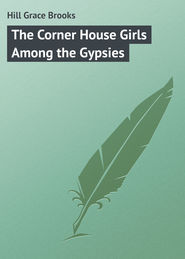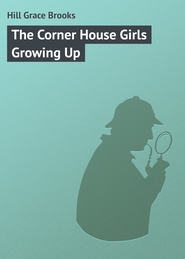По всем вопросам обращайтесь на: info@litportal.ru
(©) 2003-2024.
✖
The Corner House Girls
Настройки чтения
Размер шрифта
Высота строк
Поля
The Corner House Girls
Grace Hill
Hill Grace Brooks
The Corner House Girls / How they moved to Milton, what they found, and what they did
CHAPTER I – “LEFT HIGH AND DRY”
“Look out, Dot! You’ll fall off that chair as sure as you live, child!”
Tess was bustling and important. It was baking day in the Kenway household. She had the raisins to stone, and the smallest Kenway was climbing up to put the package of raisins back upon the cupboard shelf.
There was going to be a cake for the morrow. Ruth was a-flour to her elbows, and Aggie was stirring the eggs till the beater was just “a-whiz.”
Crash! Bang! Over went the chair; down came Dot; and the raisins scattered far and wide over the freshly scrubbed linoleum.
Fortunately the little busy-body was not hurt. “What did I tell you?” demanded the raisin-seeder, after Ruth had made sure there were no broken bones, and only a “skinned” place on Dot’s wrist. “What did I tell you? You are such a careless child!”
Dot’s face began to “cloud up,” but it did not rain, for Aggie said kindly:
“Don’t mind what she says, Dot. Leave those raisins to me. You run get your hat on. Tess has finished seeding that cupful. Now it’s time you two young ones went on that errand. Isn’t that so, Ruth?”
The elder sister agreed as she busily mixed the butter and flour. Butter was high. She put in what she thought they could afford, and then she shut her eyes tight, and popped in another lump!
On a bright and sunny day, like this one, the tiny flat at the top of the Essex Street tenement was a cheerful place. Ruth was a very capable housekeeper. She had been such for two years previous to their mother’s death, for Mrs. Kenway had been obliged to go out to work.
Now, at sixteen, Ruth felt herself to be very much grown up. It is often responsibility and not years that ages one.
If Ruth had “an old head on green shoulders,” there was reason for it. For almost all the income the Kenways had was their father’s pension.
The tide of misfortune which had threatened the family when the father was killed in the Philippines, had risen to its flood at Mrs. Kenway’s death two years before this day, and had now left the Kenway girls high and dry upon the strand of an ugly tenement, in an ugly street, of the very ugliest district of Bloomingsburg.
The girls were four – and there was Aunt Sarah Stower. There were no boys; there never had been any boys in the Kenway family. Ruth said she was glad; Aggie said she was sorry; and as usual Tess sided with the elder sister, while Dot agreed with the twelve-year-old Aggie that a boy to do the chores would be “sort of nice.”
“S’pose he was like that bad Tommy Rooney, who jumps out of the dark corners on the stairs to scare you, Dot Kenway?” demanded the ten-year-old Tess, seriously.
“Why, he couldn’t be like Tommy – not if he was our brother,” said the smallest girl, with conviction.
“Well, he might,” urged Tess, who professed a degree of experience and knowledge of the world far beyond that of her eight-year-old sister. “You see, you can’t always sometimes tell about boys.”
Tess possessed a strong sense of duty, too. She would not allow Dot, on this occasion, to leave the raisins scattered over the floor. Down the two smaller girls got upon their hands and knees and picked up the very last of the dried fruit before they went for their hats.
“Whistle, Dot – you must whistle,” commanded Tess. “You know, that’s the only way not to yield to temptation, when you’re picking up raisins.”
“I – I can’t whistle, Tess,” claimed Dot.
“Well! pucker up, anyway,” said Tess. “You can’t do that with raisins in your mouth,” and she proceeded to falteringly whistle several bars of “Yankee Doodle” herself, to prove to the older girls that the scattered raisins she found were going into their proper receptacle.
The Kenway girls had to follow many economies, and had learned early to be self-denying. Ruth was so busy and so anxious, she declared herself, she did not have time to be pretty like other girls of her age. She had stringy black hair that never would look soft and wavy, as its owner so much desired.
She possessed big, brown eyes – really wonderful eyes, if she had only known it. People sometimes said she was intellectual looking; that was because of her high, broad brow.
She owned little color, and she had contracted a nervous habit of pressing her lips tight together when she was thinking. But she possessed a laugh that fairly jumped out at you from her eyes and mouth, it was so unexpected.
Ruth Kenway might not attract much attention at first glance, but if you looked at her a second time, you were bound to see something in her countenance that held you, and interested you.
“Do smile oftener, Ruth,” begged jolly, roly-poly Agnes. “You always look just as though you were figuring how many pounds of round steak go into a dollar.”
“I guess I am thinking of that most of the time,” sighed the oldest Kenway girl.
Agnes was as plump as a partridge. When she tried to keep her face straight, the dimples just would peep out. She laughed easily, and cried stormily.
She said herself that she had “bushels of molasses colored hair,” and her blue eyes could stare a rude boy out of countenance – only she had to spoil the effect the next moment by giggling. Another thing, Agnes usually averaged two “soul chums” among her girl friends at school, per week!
Tess (nobody ever remembered she had been christened Theresa) had some of Ruth’s dignity and some of Aggie’s good looks. She was the quick girl at her books; she always got along nicely with grown-ups; they said she had “tact”; and she had the kindest heart of any girl in the world.
Dot, or Dorothy, was the baby, and was a miniature of Ruth, as far as seriousness of demeanor, and hair and eyes went. She was a little brunette fairy, with the most delicately molded limbs, a faint blush in her dark cheeks, and her steady gravity delighted older people. They said she was “such an old-fashioned little thing.”
It was Saturday. From the street below shrill voices rose in a nightmare of sound that broke in a nerve-racking wave upon the ears. Numerous wild Red Indians could make no more savage sounds, if they were burning a captive at the stake.
It was the children on the block, who had no other playground. Dot shuddered to venture forth into the turmoil of the street, and Tess had to acknowledge a faster beating of her own heart.
Dot had her “Alice-doll” – her choicest possession. They were going to the green grocer’s, at the corner, and to the drug store.
At the green grocer’s they were to purchase a cabbage, two quarts of potatoes, and two pennies’ worth of soup greens. At the drug store they would buy the usual nickel’s worth of peppermint drops for Aunt Sarah.
Every Saturday since Dot could remember – and since Tess could remember – and since Agnes could remember – even every Saturday since Ruth could remember, there had been five cents’ worth of peppermint drops bought for Aunt Sarah.
The larder might be very nearly bare; shoes might be out at toe and stockings out at heel; there might be a dearth of food on the table; but Aunt Sarah must not be disappointed in her weekly treat.
“It is the only pleasure the poor creature has,” their mother was wont to say. “Why deprive her of it? There is not much that seems to please Aunt Sarah, and this is a small thing, children.”
Even Dot was old enough to remember the dear little mother saying this. It was truly a sort of sacred bequest, although their mother had not made it a mandatory charge upon the girls.
“But mother never forgot the peppermints herself. Why should we forget them?” Ruth asked.
Aunt Sarah Stower was a care, too, left to the Kenway girls’ charge. Aunt Sarah was an oddity.
She seldom spoke, although her powers of speech were not in the least impaired. Moreover, she seldom moved from her chair during the day, where she sewed, or crocheted; yet she had the active use of her limbs.
Housework Aunt Sarah abhorred. She had never been obliged to do it as a girl and young woman; so she had never lifted her hand to aid in domestic tasks since coming to live with the Kenways – and Ruth could barely remember her coming.
Aunt Sarah was only “Aunt” to the Kenway girls by usage. She was merely their mother’s uncle’s half-sister! “And that’s a relationship,” as Aggie said, “that would puzzle a Philadelphia lawyer to figure out.”
As Tess and Dot came down the littered stoop of the tall brick house they lived in, a rosy, red-haired boy, with a snub nose and twinkling blue eyes, suddenly popped up before them. He was dressed in fringed leggings and jacket, and wore a band of feathers about his cap.
“Ugh! Me heap big Injun,” he exclaimed, brandishing a wooden tomahawk before the faces of the startled girls. “Scalp white squaw! Kill papoose!” and he clutched at the Alice-doll.
Dot screamed – as well she might. The thought of seeing her most beloved child in the hands of this horrid apparition —
Grace Hill
Hill Grace Brooks
The Corner House Girls / How they moved to Milton, what they found, and what they did
CHAPTER I – “LEFT HIGH AND DRY”
“Look out, Dot! You’ll fall off that chair as sure as you live, child!”
Tess was bustling and important. It was baking day in the Kenway household. She had the raisins to stone, and the smallest Kenway was climbing up to put the package of raisins back upon the cupboard shelf.
There was going to be a cake for the morrow. Ruth was a-flour to her elbows, and Aggie was stirring the eggs till the beater was just “a-whiz.”
Crash! Bang! Over went the chair; down came Dot; and the raisins scattered far and wide over the freshly scrubbed linoleum.
Fortunately the little busy-body was not hurt. “What did I tell you?” demanded the raisin-seeder, after Ruth had made sure there were no broken bones, and only a “skinned” place on Dot’s wrist. “What did I tell you? You are such a careless child!”
Dot’s face began to “cloud up,” but it did not rain, for Aggie said kindly:
“Don’t mind what she says, Dot. Leave those raisins to me. You run get your hat on. Tess has finished seeding that cupful. Now it’s time you two young ones went on that errand. Isn’t that so, Ruth?”
The elder sister agreed as she busily mixed the butter and flour. Butter was high. She put in what she thought they could afford, and then she shut her eyes tight, and popped in another lump!
On a bright and sunny day, like this one, the tiny flat at the top of the Essex Street tenement was a cheerful place. Ruth was a very capable housekeeper. She had been such for two years previous to their mother’s death, for Mrs. Kenway had been obliged to go out to work.
Now, at sixteen, Ruth felt herself to be very much grown up. It is often responsibility and not years that ages one.
If Ruth had “an old head on green shoulders,” there was reason for it. For almost all the income the Kenways had was their father’s pension.
The tide of misfortune which had threatened the family when the father was killed in the Philippines, had risen to its flood at Mrs. Kenway’s death two years before this day, and had now left the Kenway girls high and dry upon the strand of an ugly tenement, in an ugly street, of the very ugliest district of Bloomingsburg.
The girls were four – and there was Aunt Sarah Stower. There were no boys; there never had been any boys in the Kenway family. Ruth said she was glad; Aggie said she was sorry; and as usual Tess sided with the elder sister, while Dot agreed with the twelve-year-old Aggie that a boy to do the chores would be “sort of nice.”
“S’pose he was like that bad Tommy Rooney, who jumps out of the dark corners on the stairs to scare you, Dot Kenway?” demanded the ten-year-old Tess, seriously.
“Why, he couldn’t be like Tommy – not if he was our brother,” said the smallest girl, with conviction.
“Well, he might,” urged Tess, who professed a degree of experience and knowledge of the world far beyond that of her eight-year-old sister. “You see, you can’t always sometimes tell about boys.”
Tess possessed a strong sense of duty, too. She would not allow Dot, on this occasion, to leave the raisins scattered over the floor. Down the two smaller girls got upon their hands and knees and picked up the very last of the dried fruit before they went for their hats.
“Whistle, Dot – you must whistle,” commanded Tess. “You know, that’s the only way not to yield to temptation, when you’re picking up raisins.”
“I – I can’t whistle, Tess,” claimed Dot.
“Well! pucker up, anyway,” said Tess. “You can’t do that with raisins in your mouth,” and she proceeded to falteringly whistle several bars of “Yankee Doodle” herself, to prove to the older girls that the scattered raisins she found were going into their proper receptacle.
The Kenway girls had to follow many economies, and had learned early to be self-denying. Ruth was so busy and so anxious, she declared herself, she did not have time to be pretty like other girls of her age. She had stringy black hair that never would look soft and wavy, as its owner so much desired.
She possessed big, brown eyes – really wonderful eyes, if she had only known it. People sometimes said she was intellectual looking; that was because of her high, broad brow.
She owned little color, and she had contracted a nervous habit of pressing her lips tight together when she was thinking. But she possessed a laugh that fairly jumped out at you from her eyes and mouth, it was so unexpected.
Ruth Kenway might not attract much attention at first glance, but if you looked at her a second time, you were bound to see something in her countenance that held you, and interested you.
“Do smile oftener, Ruth,” begged jolly, roly-poly Agnes. “You always look just as though you were figuring how many pounds of round steak go into a dollar.”
“I guess I am thinking of that most of the time,” sighed the oldest Kenway girl.
Agnes was as plump as a partridge. When she tried to keep her face straight, the dimples just would peep out. She laughed easily, and cried stormily.
She said herself that she had “bushels of molasses colored hair,” and her blue eyes could stare a rude boy out of countenance – only she had to spoil the effect the next moment by giggling. Another thing, Agnes usually averaged two “soul chums” among her girl friends at school, per week!
Tess (nobody ever remembered she had been christened Theresa) had some of Ruth’s dignity and some of Aggie’s good looks. She was the quick girl at her books; she always got along nicely with grown-ups; they said she had “tact”; and she had the kindest heart of any girl in the world.
Dot, or Dorothy, was the baby, and was a miniature of Ruth, as far as seriousness of demeanor, and hair and eyes went. She was a little brunette fairy, with the most delicately molded limbs, a faint blush in her dark cheeks, and her steady gravity delighted older people. They said she was “such an old-fashioned little thing.”
It was Saturday. From the street below shrill voices rose in a nightmare of sound that broke in a nerve-racking wave upon the ears. Numerous wild Red Indians could make no more savage sounds, if they were burning a captive at the stake.
It was the children on the block, who had no other playground. Dot shuddered to venture forth into the turmoil of the street, and Tess had to acknowledge a faster beating of her own heart.
Dot had her “Alice-doll” – her choicest possession. They were going to the green grocer’s, at the corner, and to the drug store.
At the green grocer’s they were to purchase a cabbage, two quarts of potatoes, and two pennies’ worth of soup greens. At the drug store they would buy the usual nickel’s worth of peppermint drops for Aunt Sarah.
Every Saturday since Dot could remember – and since Tess could remember – and since Agnes could remember – even every Saturday since Ruth could remember, there had been five cents’ worth of peppermint drops bought for Aunt Sarah.
The larder might be very nearly bare; shoes might be out at toe and stockings out at heel; there might be a dearth of food on the table; but Aunt Sarah must not be disappointed in her weekly treat.
“It is the only pleasure the poor creature has,” their mother was wont to say. “Why deprive her of it? There is not much that seems to please Aunt Sarah, and this is a small thing, children.”
Even Dot was old enough to remember the dear little mother saying this. It was truly a sort of sacred bequest, although their mother had not made it a mandatory charge upon the girls.
“But mother never forgot the peppermints herself. Why should we forget them?” Ruth asked.
Aunt Sarah Stower was a care, too, left to the Kenway girls’ charge. Aunt Sarah was an oddity.
She seldom spoke, although her powers of speech were not in the least impaired. Moreover, she seldom moved from her chair during the day, where she sewed, or crocheted; yet she had the active use of her limbs.
Housework Aunt Sarah abhorred. She had never been obliged to do it as a girl and young woman; so she had never lifted her hand to aid in domestic tasks since coming to live with the Kenways – and Ruth could barely remember her coming.
Aunt Sarah was only “Aunt” to the Kenway girls by usage. She was merely their mother’s uncle’s half-sister! “And that’s a relationship,” as Aggie said, “that would puzzle a Philadelphia lawyer to figure out.”
As Tess and Dot came down the littered stoop of the tall brick house they lived in, a rosy, red-haired boy, with a snub nose and twinkling blue eyes, suddenly popped up before them. He was dressed in fringed leggings and jacket, and wore a band of feathers about his cap.
“Ugh! Me heap big Injun,” he exclaimed, brandishing a wooden tomahawk before the faces of the startled girls. “Scalp white squaw! Kill papoose!” and he clutched at the Alice-doll.
Dot screamed – as well she might. The thought of seeing her most beloved child in the hands of this horrid apparition —











